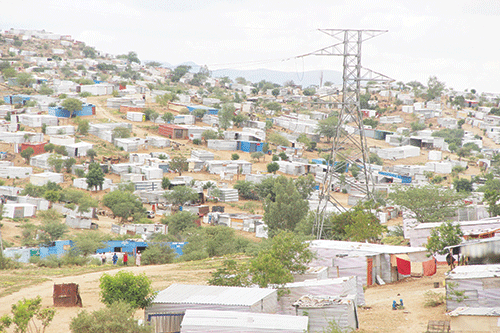Lahja Nashuuta
Havana informal settlement residents have taken it upon themselves to fix and clean their communal toilets.
Some have gone as far as using their own miniscule financial resources to repair broken toilets, as the Windhoek municipality has been failing them as far as speedily fixing blocked and broken toilets.
Information obtained from the City of Windhoek indicates that there are 121 toilets in Havana informal settlement, of which 93 need repair.
Currently, more than 100 000 Havana inhabitants rely on 28 public toilets. Only a few of them are in working condition, while residents are required to ferry water in containers to the toilets when nature calls.
Johannes Iileka, of Havana Proper, shared their plight with this paper recently.
So dire is their situation, he said, that it forces many residents to relieve themselves in the open and at night, compromising their safety, while women and children are forced to use buckets, which they dispose of in the river-beds the next morning.
The situation, Iileka said, has trampled on their human rights.
Another Havana resident, Helodia Amadhila, is concerned about using public toilets at night for security and health reasons. “It is tough when nature calls during the night because the only available toilet is very far, and there are lots of bad people in the area. Although I stay with my sons, sometimes they are not in the house and there is no one to escort me, leaving me with no choice but to use a bucket which is very unhygienic,” Amadhila stated.
Fellow resident Joe Simeon said “we decided to dig our own toilet because there is nowhere to relieve ourselves. This place is overcrowded, and open spaces are scary. It’s a terrible situation we are living in.”
The City of Windhoek has revealed its intention to reduce the toilet provision to a maximum of 20 households per public toilet, and to ensure that residents have convenient access within a 100- metre radius.
This is according to the City’s spokesperson Lydia Amutenya while responding to this newspaper’s questions on their plans to address the lack of ablution facilities and potable water in Windhoek’s informal settlements.
According to Amutenya, there are 342 existing toilets in Moses ||Garoëb constituency and 79 pit toilets, of which eight public toilets are in the Havana informal settlement.
The City council is currently implementing a comprehensive five-year programme, scheduled for completion by June 2025, which specifically targets various constituencies, including Moses ||Garoëb, where Havana informal settlement is situated.
“Our objectives within this initiative are two-fold. Firstly, we aim to decrease the ratio of households sharing a single toilet to a maximum of 20 households, ensuring that residents have convenient access within a 100-metre radius,” Amutenya said.
The City also plans to reduce the number of households relying on a single standpipe to 40 households, with a maximum walking distance of 200 metres.
However, Amutenya has highlighted the vandalism of toilets and communal taps as one of the main challenges confronting the cash-strapped municipality.
“Frequently, we must allocate resources towards replacing stolen or damaged parts of toilets and taps, diverting our focus from regular maintenance efforts,” Amutenya said.
– lnashuuta@gmail.com


